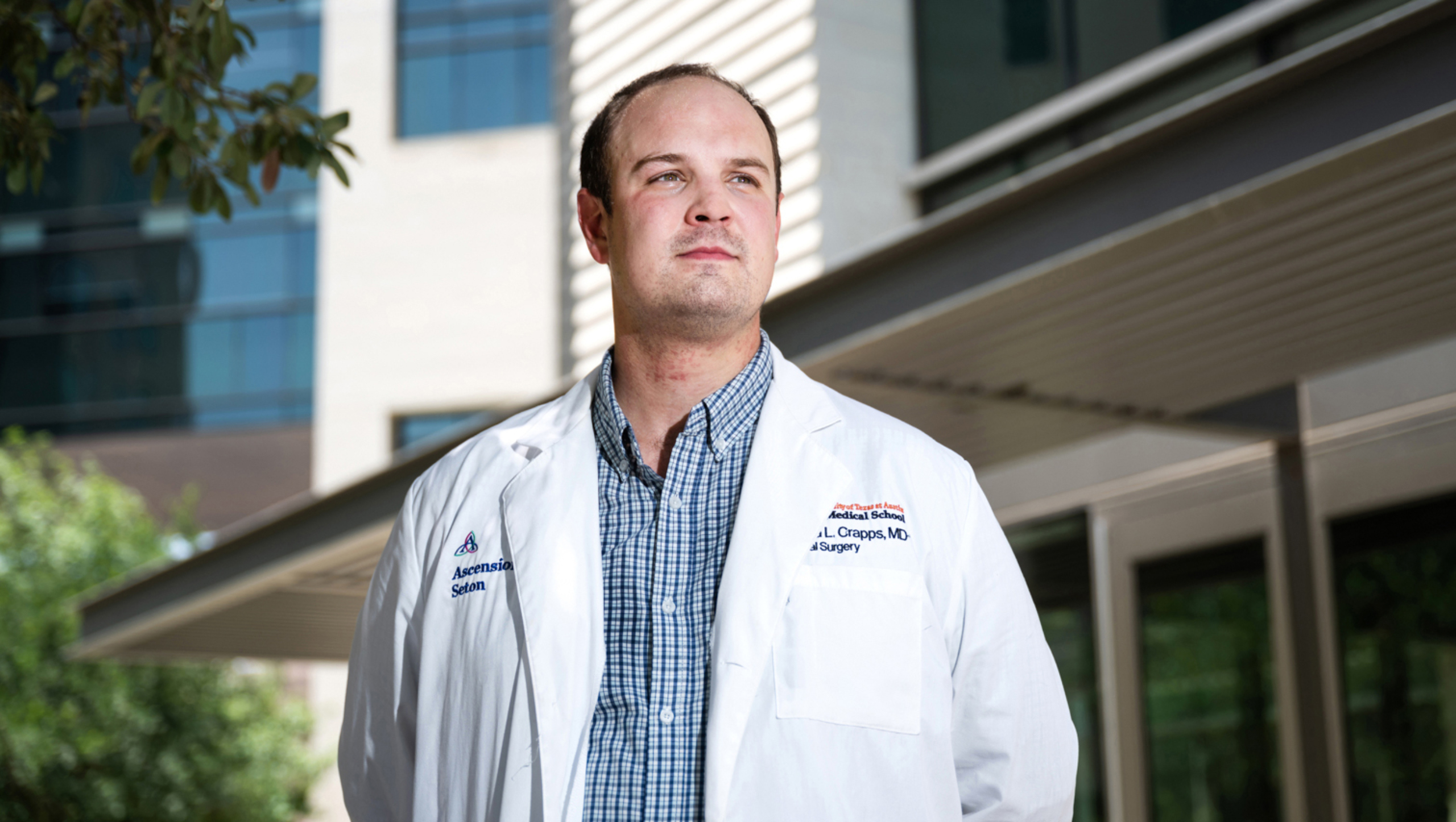For Joshua Crapps, M.D., the path to medicine took shape early — influenced by the rugged environment of his hometown in Alaska, a knack for working with his hands and a steady commitment to helping others.
Now a general surgery resident, Crapps has found his place in the operating room, where technical precision and patient-centered care intersect to serve the most critically ill and injured. His dedication to advancing trauma care was recognized with the Excellence in Research by a Postdoctoral Clinical Trainee Award at Dell Medical School’s fifth annual Ken Shine Excellence in Research and Research Mentorship Awards this spring, honoring his work to study the reliability of chest X-rays for blunt thoracic aortic injury.
Alongside his residency training, Crapps completed a fellowship in surgical critical care and will pursue a vascular surgery fellowship following graduation. Both fields allow him to work at the intersection of urgent need and surgical innovation — whether stabilizing patients in their most vulnerable moments or applying emerging vascular techniques to save lives.

Joshua Crapps, M.D.
Q&A With Crapps:
Tell us a little about yourself. What led you here?
I grew up in Anchorage, Alaska, where I spent a lot of time outdoors — fishing, hiking, camping and working with my hands. That lifestyle shaped how I approach my work today: with focus, adaptability and persistence.
I’ve always been drawn to medicine. It combines everything I am drawn to — technical skill, problem-solving and the opportunity to help people in meaningful ways. That pull led me to general surgery and, ultimately, to trauma, critical care and vascular surgery.
Trauma and critical care give me the chance to help the sickest surgical patients. Vascular surgery fits naturally into that world, especially when patients have blood vessel injuries requiring specialized care. Plus, vascular surgery is always evolving, with new technologies and techniques emerging all the time — that constant growth and innovation really excites me.
What’s one advancement in trauma or vascular surgery that excites you most right now, and why?
I’m especially excited by the growing use of endovascular therapy — a minimally invasive way to treat vascular trauma, or injuries to blood vessels, using small tools like stents or coils. Traditionally, these injuries — especially in the arms and legs — were treated with open surgery. Now, endovascular techniques are being used more often to manage trauma safely and with fewer complications.
This approach is becoming commonplace for injuries within the chest or junctional areas where the arms and legs connect to the body. It’s now being explored for extremity trauma, with recent studies evaluating its safety and effectiveness.
In such high-stakes, fast-paced environments, how do you stay grounded and maintain that personal connection with your patients?
I think that in trauma, you inevitably form a personal connection with your patients and their families. People admitted to the hospital following a trauma may be going through one of the worst experiences of their life. This necessitates clear communication to build that relationship and trust.
Many of these admissions require complex decision-making and multidisciplinary discussion of both surgical and nonsurgical options. It’s very important to establish what the patient’s and families’ understanding of the medical problems are and what their goals of care are.
What’s something people often misunderstand about what it’s like to be a surgical resident?
While the hours and demands of surgical residency are high, I also have a wife and three children at home. I feel that over the course of my training, I have been able to be a present father and husband and be there for the majority of important life events. While yes, some sacrifices are made, this is present in any postgraduate training pathway. The camaraderie that exists among surgical residents in this program is great and allows for us to cover for each other when needed.
If someone remembers just one thing about you, what do you hope it is?
That I genuinely love what I do. I love performing surgery and using my knowledge and skills to help people. A common interview question is, “What would you do if you couldn’t do this?” Honestly, there’s no world where I wouldn’t be a doctor. If I had to, I’d work as long and as hard as it took to get right back to where I am today.
Graduate medical education, or GME, refers to the period of education in a particular specialty or subspecialty following completion of medical school. This continuation of training through residency and fellowship programs provides the clinical and educational experience needed for physicians to achieve autonomy, deliver high-quality patient care, and prepare for challenges in an evolving health care landscape.
Dell Med serves as the academic home and Ascension Seton as the clinical home for 494 resident and fellow physicians within more than 45 residency and fellowship programs ranging from family medicine and neurology to pediatric emergency medicine and cardiovascular disease.